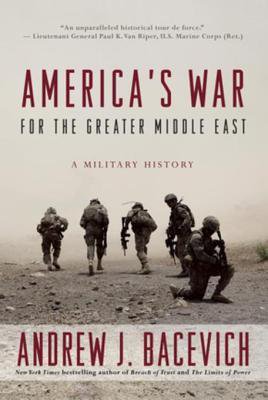Author and retired Army colonel Andrew Bacevich puts the current flare in tensions with Iran in historical context.
June 29, 2019
Tensions between the United States and Iran have continued to rise in recent weeks. In the early hours of Thursday June 20, Iran shot down an unpiloted U.S. drone aircraft flying in what it claimed was Iranian territorial airspace. The next day, President Donald Trump approved, then called off, a military strike against Iranian targets. He followed with two executive orders on June 24 calling for increased sanctions targeting Iranian government officials. Iran, in response, says it will increase the production of enriched uranium beyond the limits previously agreed to.
In the wake of growing concerns over last week’s aborted missile attack on Iran, the Republican-controlled Senate, in the longest voting period in modern history, on June 28 rejected an amendment that sought to require Trump to seek Congressional approval before taking military action against Iran.
The widespread view is that this current crisis stems from the May 2018 unilateral withdrawal by the United States from the Joint Comprehensive Plan of Action, known as the “Iran Nuclear Deal,” signed in July 2015. But longtime observers of the region see the origins of the current conflict in a much longer time frame.

Andrew Bacevich is a retired Army colonel and professor of international relations and history at Boston University. He is the author of numerous books on U.S. military history and foreign policy. Bacevich is author of the 2016 book America’s War for the Greater Middle East: A Military History, which looks at the historical context for the current aggressive posture. I spoke with Bacevich by phone on June 25, and began by asking about the origins of the current conflict.
Bacevich: I think there are two singular events, one of which determines where Iranians preferred to start the story of U.S.-Iran relations down to the present moment, and there is another such event that defines when the United States wants to start telling that story. For the Iranians, the start point is the CIA-engineered coup that overthrew [Iranian Prime Minister] Mohammad Mosaddegh.
Q: In 1953?
Bacevich: Right, blatantly interfering in the internal affairs of Iran, and, in doing so at a time in which we were actually acting counter to the values that we supposedly represented in the Cold War and that we have supposedly represented ever since. Overthrowing a democratically elected government, reinstalling the Shah in power, and, thereby, opening the door for decades of authoritarian rule. That offense is where they want to begin the story.
For us, we want to begin the story with the Iranian revolution and the [1979-1980] hostage crisis, a great humiliation done to the United States, and one which we really have not gotten over.
If you tried to put today’s crisis in historical perspective, I think it’s important to acknowledge that the narrative has a different starting point for the Iranians than it does for the Americans.
And the issue of who is the party that has been offended, which is the party that is the source of harm? We have fundamentally different views on that, and I think that that difference of perspective shapes attitudes down to the present moment in very important ways.
Q: What were U.S. interests that would lead the CIA to engineer that coup?
Bacevich: Well, I think they were ideological and they were mineral. I mean, it was oil and it was communism. If there was a perception, I think we know definitively that it was a false or misleading perception that the Communist Party in Iran was very powerful, and that Mosaddegh was very much under the influence, if not the control, of the Communist Party.
And, therefore, there was a perception within the Eisenhower Administration, particularly strong, I think within the CIA, that Iran was going to go communist. Which would have strategic implications in terms of the Cold War, but also implications in terms of the world’s oil supply.
And in putting the Shah back on his throne, in contrast, was going to give us somebody who was not simply going to be a loyal ally, but who we could control. Because the American perception in 1953 was that the Shah was weak, a weak personality, and, therefore, someone we could count on basically towing the line required by the United States.
Q: Now fast forward twenty-five years, and the “Carter Doctrine,” as it has come to be called, was specifically about that issue of oil.
Bacevich: Yes. I think the Carter Doctrine continues to be the overarching source, the rationale, for virtually everything that has followed since. Americans at the present moment, tend to think that it’s 9/11 that triggered the mess that we find ourselves in today. I think it’s much more accurate to say it’s the Carter Doctrine.
The planners, back in the Pentagon sat down and said, looks like we have to be ready to intervene in the Persian Gulf. How are we going to get ready to do that? And they came up with an answer that included the creation of the United States Central Command, an answer that included establishing various bases, stockpiling equipment, beginning military exercises in the region, putting together war plans that would explain how we would go to war in the Persian Gulf, where the initial enemy was going to be the Soviet Union.
“It’s important to acknowledge that the narrative has a different starting point for the Iranians than it does for the Americans.”
Q: The Straits of Hormuz is always sort of held up as this very important strategic point, because it’s a narrowing where the Iranian government could potentially block the flow of oil out of the Persian Gulf. Is that something we should be concerned about?
Bacevich: I don’t know what percentage of the world’s oil supply transits the Straits of Hormuz, but it’s a big number. Therefore, the Straits of Hormuz do have a great strategic significance from a global point of view. But I think most the oil through the Straits of Hormuz goes to Japan and to China, therefore, they have a direct and immediate interest in ensuring that oil continues to flow.
Now I’ve long believed it doesn’t follow that we [the United States] have a direct and immediate interest, since we are not dependent upon oil from the Persian Gulf in order to sustain our prosperity and our economy. We could get along rather nicely even if we didn’t have access to Persian Gulf oil, which, by the way, was not the case back in 1979 and 1980, when President Jimmy Carter promulgated the Carter Doctrine.
Q: There has been a lot of noise about the shoot-down of this unpiloted drone that happened near or over the Strait of Hormuz on June 20. Yet the United States shot down an Iranian passenger airliner on July 3, 1988, in that same area in which 290 people died. Is that something that is even remembered anymore anywhere outside of Iran?
Bacevich: No. But inside Iran, absolutely. I mean, again, just like we remember the hostage crisis, which we view as totally unjustified, they remember the Iran Air shoot-down. Like the recent drone shoot-down, there was disagreement about all kinds of things related to the Airbus’s flight pattern. But it is a fact that the Chairman of the Joint Chiefs of Staff at the time, Admiral [William J.] Crowe, consciously lied about the position of the USS Vincennes, which was in Iranian territorial waters when it launched that missile.
Q: What about the 2015 nuclear deal that was signed by President Barack Obama. It was sort of a signature accomplishment of his administration and now has been abrogated by the Trump Administration.
Bacevich: It was, I think, the signature foreign policy accomplishment of the Obama Administration, and I supported it, because, if it retarded Iran’s ability to acquire a nuclear weapon, that was a good thing for everybody. Good for American security. Good for regional security.
And, I believed that the Iran Nuclear Deal could have been a first step toward creating a new atmosphere, not only for U.S.-Iranian relations, but also for Iran’s relations with its neighbors. It would only have been a first step on a long journey, but it could have provided the basis for a more peaceful regional order.
Instead, what we have is Trump comes in abrogates the deal, climbs in bed with Saudi Arabia, and we helped to further destabilize the region, and the possibility of any kind of a remotely harmonious relationship between Iran and the United States does now appear to be implausible. So Trump’s policies with regard to Iran have been disastrous.
Tags
Dispatches Iran War And Peace In the News

Norman Stockwell
Norman Stockwell is publisher of The Progressive.Read more by Norman Stockwell
June 29, 2019
